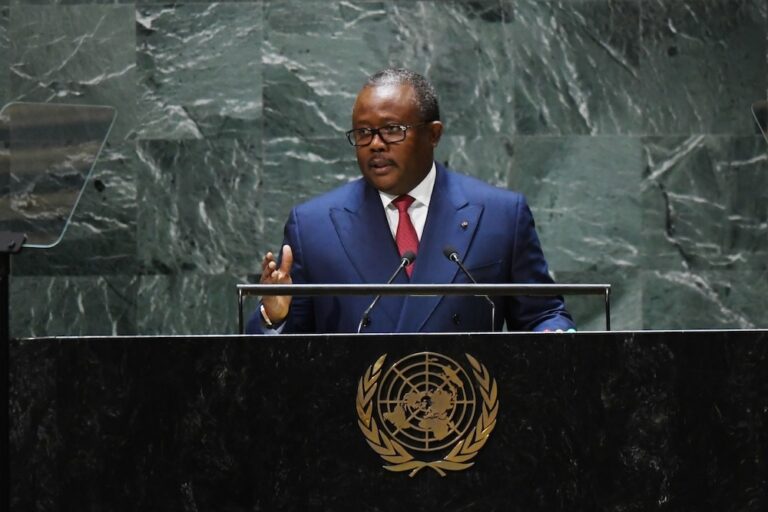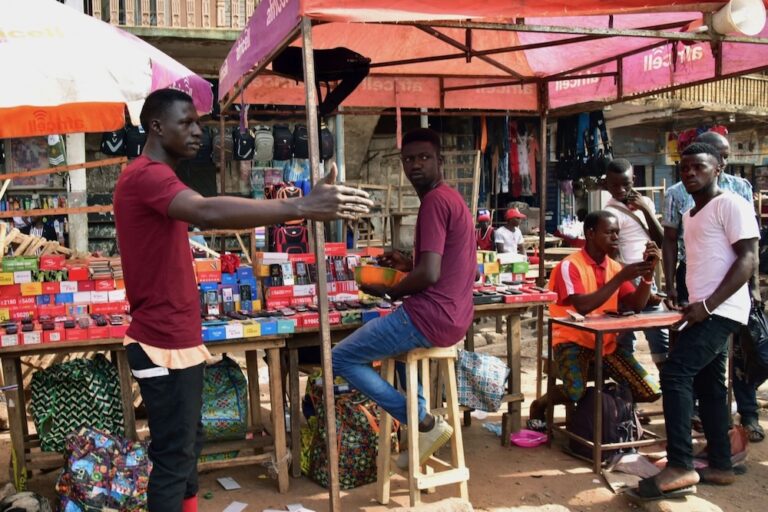March 2024 in Africa: A free expression round-up produced by IFEX’s Regional Editor Reyhana Masters, based on IFEX member reports and news from the region.
Stanis Bujakera Tshiamala released
While the release of journalist Stanis Bujakera Tshiamala on 19 March was welcomed by family, friends, colleagues, and media advocacy organisations from around the globe, relief was tinged with a sense of absurdity and frustration. The actions of authorities in the Democratic Republic of Congo – from his arrest, to his conviction and sentencing of six months, coupled with a fine – point to a deliberate and pointed campaign of harassment aimed at intimidating the journalist into silence.
Even on 18 March, the day of sentencing, when the court agreed that he should be released on the basis that he had already spent six months in pretrial detention, the state prosecutor lodged an appeal for him to remain in custody and in so doing extended the reporter’s time behind bars once again.
The charges brought against the deputy director of the DRC-based news website Actualite.cd and reporter for Reuters relate to a 31 August article published by the Paris-based pan-African news magazine Jeune Afrique that he is also a correspondent of. The prolonged detention, the cycle of delayed hearings, the charges of spreading falsehoods, forgery, use of forged documents, and distributing false documents and the subsequent conviction all relate to an article he did not author and a memo he did not generate.
The lawfare against Bujakera, who is a Congolese citizen and a permanent US resident, started when he was arbitrarily arrested on 8 September 2023, just as he was about to board a flight to Lubumbashi from Kinshasa. As Amnesty International reports: “he was unlawfully detained for three days before being placed under provisional detention on 11 September. His mobile phones and computer were seized and searched without a warrant”.
Far from being deterred, Bujakera told Reporters Without Borders (RSF) that he “wanted to continue his fight for independent journalism that fears nothing and called on Congolese journalists not to give in to any pressure”.
He also expressed his gratitude for the support of colleagues, as well as RSF for their coordination of a campaign for his release that mobilised local and international supporters, and included discussions with authorities in DRC and appeals to the United Nations and the Media Freedom Coalition.
“Human Sexual Rights and Family Values Act” sparks a standoff
Ghana’s executive arm and parliament are currently clashing over the Human Sexual Rights and Family Values Act, which was unanimously passed by parliament on 28 February. The discord has intensified to the extent where opposition members of parliament are threatening to impeach President Nana Akufo-Addo if he does not assent to the Act.
Considered one of the harshest anti-LGBTQIA+ pieces of legislation in Africa, it increases criminal penalties for consensual same-sex conduct and criminalises individuals and organisations who advocate or support the rights of lesbian, gay, bisexual, and transgender people.
Prior to the threat of impeachment, President Akufo Addo refused to sign the Act into law until the Supreme Court rules on its constitutionality. Access Now reports that: “since the bill’s passing, two suits have been filed at Ghana’s Supreme Court seeking to prevent the president from assenting to the bill.”
Describing his stance as “contemptuous”, speaker of parliament Alban Bagbin said the president’s refusal to act on the bill “was unconstitutional” and that, in turn, parliament would not consider the nominations for new ministerial positions that the government submitted for approval during a February Cabinet reshuffle.
The president’s hesitancy hinges on national political fallout and international economic considerations. With the country’s general and presidential elections scheduled for December 2024, he has to navigate the labyrinthine path of appeasing the conservative segment of Ghanaian citizens who wield power in terms of a voting population.
At the same time, the government is concerned about pressure from international donors and the threat of withdrawal of investment and funding. This is based on the Ugandan experience when the World Bank halted new lending to the country when it passed a similar anti-LGBTQIA+ law in May 2023. Ghana’s Finance Ministry has warned that final presidential approval of the legislation could lead to the loss of $3.8 billion in World Bank financing over the next five to six years, derailing a $3 billion loan package from the International Monetary Fund (IMF).”
The massive harmful impact of the bill is best articulated by a spokesperson for advocacy organisation Rightify Ghana, who points out:
“The Bill’s clampdown on access to information and freedom of expression will directly impede LGBTQ+ people in Ghana from accessing vital resources, particularly on digital safety, which has been crucial in preventing cases of entrapment, extortion, and assault. In a context where bad faith actors exploit the growing intolerance to target LGBTQ+ people online using tactics such as entrapment and cyber-harassment, stifling advocacy and press freedom … This bill will only serve to put people in danger and the president must reject it.”
Major setback for women and girls in The Gambia
On 18 March, women picketed outside The Gambia’s parliament to protest a private members’ bill seeking to lift the ban on female genital mutilation (FGM). The bill passed its second reading during which 53 male members of the National Assembly voted for it and only four voted against it. According to Semafor: “The bill will now be reviewed by a parliamentary committee before a final vote. A date has not yet been set for the committee’s review.
FGM was outlawed in 2015 through the Women’s (Amendment) Act, 2015, legislated during former president Yahya Jammeh’s rule. Individuals who engaged in the practice were subject to fines or prison sentences of up to three years. The law also punished perpetrators with life imprisonment in instances where the practice led to death.
The debate is pitting influential Muslim clerics who push FGM as a required Islamic custom against rights activists and feminists who refute this. As Isatou Touray, former vice president and founder of the anti-FGM organisation GAMCOTRAP told Deutsche Welle: “Who has the right to interfere in what Allah had created, and who has the right to define how a woman should look?”
Constriction of civic space
Civic freedoms in the West African region are rapidly declining, especially in countries currently governed by transitional authorities.
The dissolution of student body the Association of Pupils and Students of Mali (L’Association des Elèves et Etudiants du Mali) is indicative of Mali’s crackdown on peaceful dissent, political opponents, and the media in recent months. The UN Office for Human Rights (OCHR) expressed its “deep concern” at the closure of four organisations “in what appears to be part of increasing restrictions on human rights and fundamental freedoms.” Authorities accused the body of “provoking disruptions of classes, killings, murder and the destruction of public and private property through demonstrations.”
In neighbouring Burkina Faso, “the military junta is increasingly abducting civil society activists and political opponents as part of its crackdown on peaceful dissent,” reports Human Rights Watch (HRW). With record-breaking numbers of kidnappings of nationals for ransom, it makes it easier to pass off the seizure of journalists, critics, and opponents as part of this growing and enterprising economic industry.
Since November 2023, six activists and opposition party members – Rasmané Zinaba, Bassirou Badjo, Guy Hervé Kam, Ablassé Ouédraogo, and Daouda Diallo – were taken from different places in the capital Ougadougou by men in plainclothes or individuals claiming they were from the national police.
While the authorities have not provided information on the whereabouts of any of the abductees, on 18 February a video featuring Ouédraogo and Diallo in combat fatigues participating in military exercises was posted on social networks. HRW was unable to verify the authenticity of the video. It is suspected that authorities used an April 2023 decree to forcibly conscript Ouédraogo and Diallo into the military.
This onslaught against critics has ostensibly encompassed the media.
The Media Foundation for West Africa (MFWA) report “No breather for the media in Burkina Faso as junta, its fanatics go on rampage” categorically states:
“The year 2023 will go down as one of the most repressive in the history of Burkina Faso’s media, characterized by a blitz of suspensions and closure of media houses, expulsion of foreign correspondents, threats against critical journalists and media outlets by the junta, its fanatical supporters, and intimidating interrogations of journalists.”
In their analysis, the MFWA points to a concerning trend where sectors of the population have “bought into the patriotism mantra of the military government”, which has “allowed a large latitude to go after suspected “unpatriotic’ journalists, activists, and media outlets with impunity.”
In brief
The hearing of The Gambia’s former interior minister Ousman Sonko on his role in the murder of journalist and RSF correspondent Deyda Hydara began in Switzerland at the beginning of March.
On 24 March, the regional office of the Media Institute of Southern Africa launched “AI Report on Southern Africa”, a look at the state and level of infrastructure and support facilities in the region, which will be a significant factor in uptake and utilisation of AI.
The National Broadcasting Commission, Nigeria’s regulating body, has gone back to court to appeal the court’s refusal to reverse judgment restraining it from imposing fines on broadcast stations.
Somalia’s newly appointed Media Council consists mainly of government allies. It is made up of information ministry advisers, former parliamentarians, a lawyer who is reportedly close to a member of the government, and one journalist.
Investigative journalism unit amaBhungane warns that the General Intelligence Laws Amendment Bill (Gilab), which is currently working its way through South Africa’s parliament, has potential to dramatically alter freedom of speech and freedom of expression landscape in the country.
An electronic communications bill that will be submitted to Ivory Coast’s National Assembly in mid-April contains two lines on the transmission of electronic messages that could be used arbitrarily against journalists and criminalise journalism.



